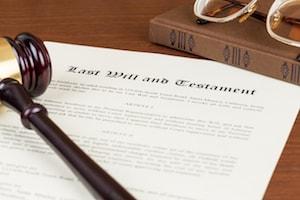What Is a Will, and How Can I Create One in Illinois?
 For any person over the age of 18, there is no better time than the present to create a Last Will & Testament. Nobody likes to think about what will happen after they pass away, but a Will is a person’s way of ensuring that everything they leave behind (their estate) is handled the way that they prefer.
For any person over the age of 18, there is no better time than the present to create a Last Will & Testament. Nobody likes to think about what will happen after they pass away, but a Will is a person’s way of ensuring that everything they leave behind (their estate) is handled the way that they prefer.
In the unfortunate event that a person passes away without a Last Will & Testament, their estate (the sum of their assets minus any liabilities/debts owed at that time) will be divided up according to the laws of the state of Illinois, which means the estate may be divided up in a different way from what the person actually wanted.
Whether you want to leave assets to your children or distribute your property to various friends and family members, a Last Will & Testament will ensure that your remaining funds and property are handled the way you wish.
Is an Attorney Necessary for Creating a Will?
While anyone can create a Will on their own, doing so is not recommended. There are many factors to consider when creating a Last Will & Testament, and doing so without an attorney can lead to undesirable outcomes.
When creating a Will, it is required by Illinois law that it be signed in the presence of two witnesses. The person creating the Will must also be of sound mind at the time they sign it. If there is any dispute as to whether the person was of sound mind at the time the Will was signed, the validity of the Will could be contested.
Small details that may seem insignificant when you are creating your Will could cause major problems after you die, possibly resulting in your survivors contesting certain aspects of the Will. It is difficult for a lay person to know exactly what could be contested and what could invalidate a Will, which is why it is very important, especially for those who have an estate of even moderate value, to consult with an estate planning attorney before finalizing and signing a Last Will & Testament.
Does a Will Become Public Record Once it Is Filed?
After the Testator of the Will has passed away, and their Executor has filed the Will with the Clerk of the Court (as required by law), the Will does then become a public record. This is because there is a probate court process which is intended to clarify what is detailed in the Will, and then to distribute the assets accordingly. Probate is a court-supervised legal process which assists the Executor in settling final affairs and paying any valid debts and taxes prior to distributing the remaining assets. It is also during the probate process that a Will can be contested. However, probate is not automatically necessary just because a person had a Will.
Trust a Hillside Estate Planning Attorney to Protect the Validity and Integrity of Your Will
The Law Office of Vincent C. Machroli, P.C. can help you create a Will that will protect and preserve your estate, ensure that your wishes are carried out correctly, and may eliminate the need for probate. We understand that every client has a unique estate, and that personal circumstances vary, and we will take the time to learn about your needs and goals to best meet your objectives. Contact an Oak Park Wills and Trusts attorney today at 708-449-7400 to schedule a no-charge consultation.
Sources:
https://www.forbes.com/2010/09/07/do-it-yourself-will-mishaps-personal-finances-estate-lawyers-overcharge.html#479ffc95c375

















